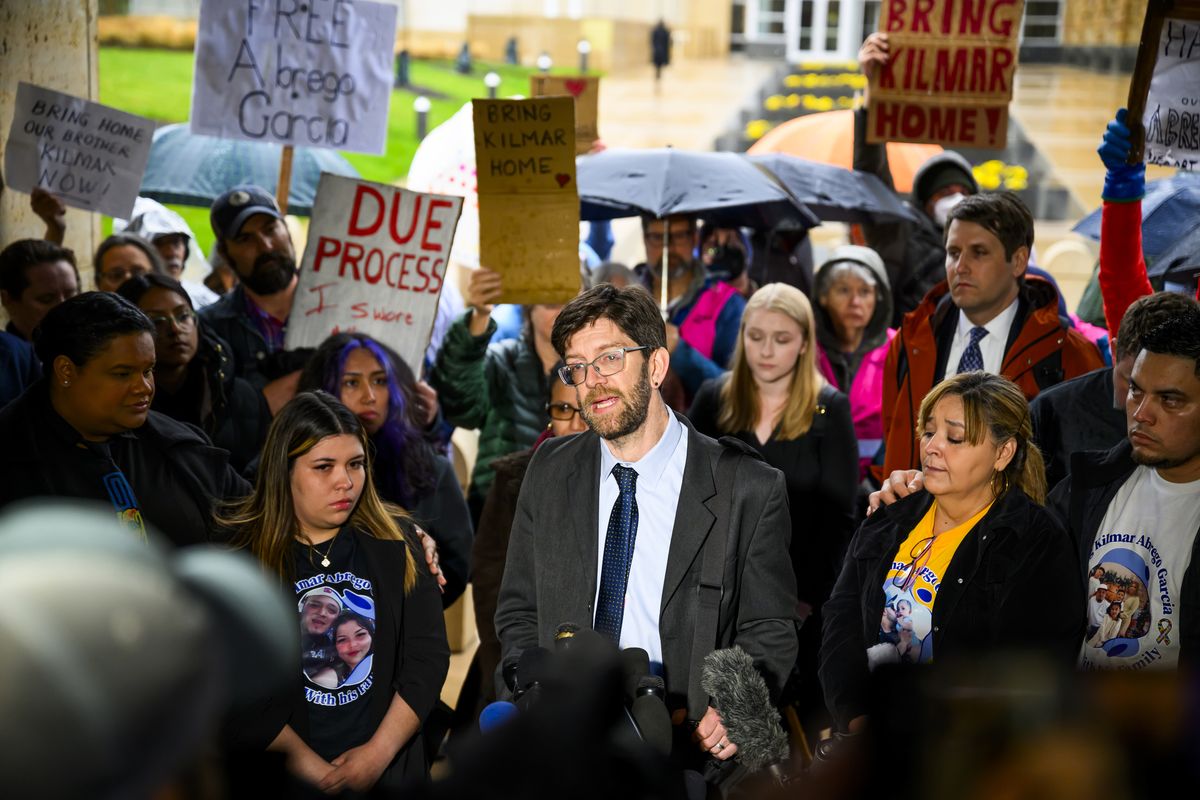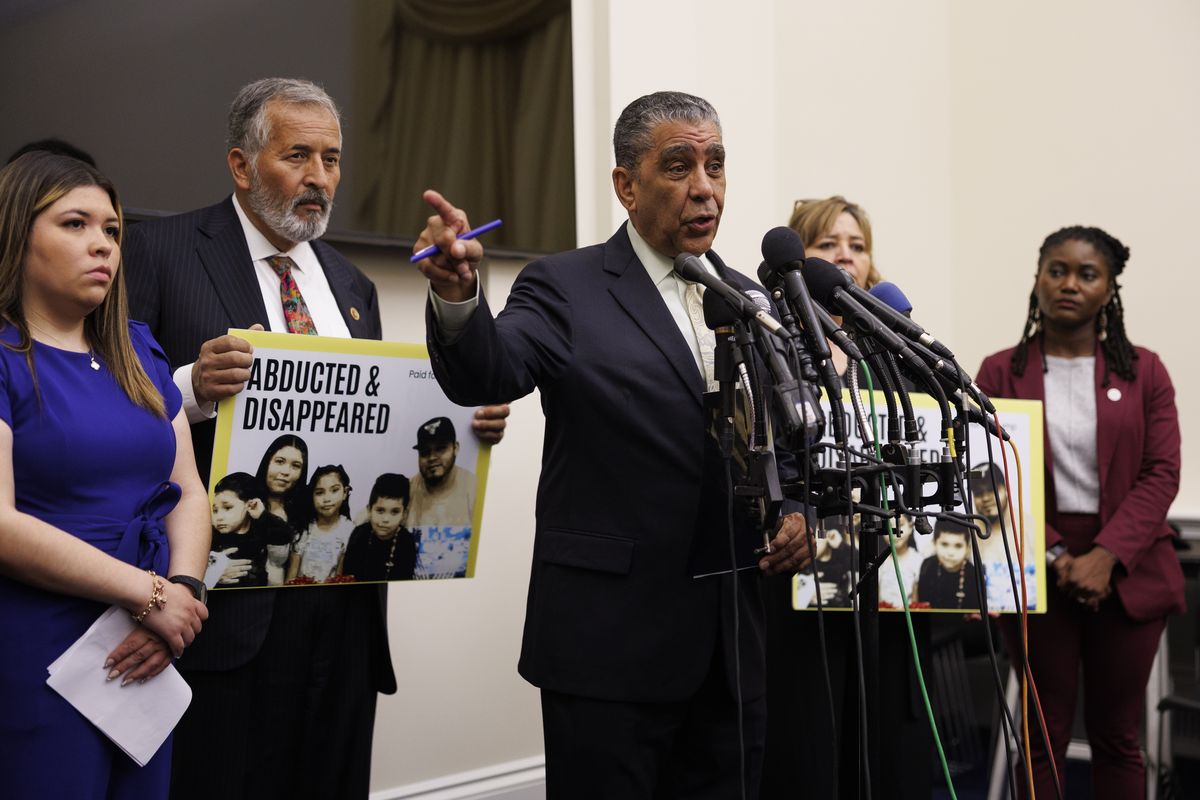Justice Department skirts judge’s deadline on plans to return wrongly deported man
Simon Sandoval-Moshenberg, an attorney for Kilmar Abrego García, the Maryland man who was wrongly deported to a Salvadoran prison, speaks to the media after a hearing in U.S. District Court in Greenbelt, Maryland, on Friday. MUST CREDIT: Pete Kiehart/For The Washington Post (Pete Kiehart/For The Washington Post)
The Trump administration refused to meet a federal judge’s deadline Friday to share steps officials are taking to facilitate the return of a Maryland man mistakenly deported to a megaprison in El Salvador, saying in a court hearing that the government needs more time to comply with a Supreme Court order.
A Justice Department lawyer told U.S. District Judge Paula Xinis at a hearing that the Trump administration was “still reviewing the Supreme Court’s decision” regarding 29-year-old Kilmar Abrego García, a Maryland resident who was illegally deported to El Salvador last month.
The government’s attorney, Drew C. Ensign, said he could not answer the judge’s questions about Abrego García’s whereabouts, including where the man is being held, what the government has done so far to secure his return and what it plans to do next.
“I’m asking a very simple question,” Xinis said to Ensign. “Where is he?”
“I do not have that information,” Ensign said.
The standoff continued throughout the hearing as the government, which had already disregarded two court orders that day, refused to give clear answers to Xinis’s questions – the kind of friction between the executive and judicial branches that has prompted concern among legal experts that the country may be on the brink of a constitutional crisis.
By the end of the 20-minute hearing, Xinis, appearing frustrated, had issued a new order: The Trump administration, she said, must file daily status updates with the court about the government’s progress getting Abrego García back to the United States.
“You can tell me what you can, what you can’t and why,” she said. “But we’re going to make a record of what, if anything, the government is doing or not doing.”
Last month, Ensign found himself in the crosshairs of another federal judge in a lawsuit challenging the Trump administration’s use of the Alien Enemies Act to abruptly send more than 200 people to a prison in El Salvador without hearings. In that case, Ensign repeatedly asserted his ignorance of key facts, telling James E. Boasberg, chief judge for the U.S. District Court for the District of Columbia, that he had no information about flights carrying deportees off U.S. soil.
On Friday, Xinis also invited Abrego García’s lawyers to brief “what violations you see, what remedy you’re seeking.”
After the hearing, Simon Sandoval-Moshenberg, one of Abrego García’s attorneys, refrained from specifying what remedies they may ask of Xinis if the government doesn’t comply with the District Court’s and Supreme Court’s orders – which could include a ruling of contempt, fines and detention. But he said the legal team will not “be sitting back and waiting.”
“If they don’t take today’s order seriously,” Sandoval-Moshenberg said, “we’ll respond seriously.”
Attorneys for Abrego García, who is married to a U.S. citizen, say the sheet metal apprentice and father of three is at risk of harm or death in El Salvador’s Terrorism Confinement Center, which holds many gang members. He fled El Salvador as a teen after the Barrio 18 gang there attempted to extort his mother, who owned a pupusa shop in their small town, then tried to recruit Abrego García, his lawyers say.
Xinis has said there is no evidence Abrego García is a gang member, despite allegations from the Trump administration that he is part of MS-13’s “Western” clique in New York – a place, the judge noted in an earlier ruling, he has never lived.
The legal fight over Abrego García’s mistaken removal has been brewing in Maryland for a month, since he was detained by U.S. Immigration and Customs Enforcement agents and expelled alongside more than 200 people to El Salvador on March 15 – despite a court ruling in 2019 prohibiting his removal. An immigration judge said at the time that he had provided sufficient evidence his life would be in danger if he was sent back to El Salvador.
The Trump administration, which said it paid about $6 million to El Salvador for the detention of the deportees, has said it cannot remove Abrego García from the megaprison because he is now in the custody of a foreign government. Abrego García’s lawyers have said he “sits in a foreign prison solely at the behest of the United States, as the product of a Kafkaesque mistake.”
Xinis had initially ordered the Trump administration to return Abrego García by midnight on Monday. A different Justice Department attorney, Erez Reuveni, had said in court that he did not know what authority the U.S. used to remove Abrego García – and he was later placed on suspended leave.
The Justice Department quickly appealed Xinis’s ruling, and the Supreme Court ruled to temporarily pause Xinis’s order while it considered the case. In a 9-0 ruling Thursday evening, the high court affirmed the district court’s ruling, and soon afterward Xinis ordered the Trump administration to tell her by Friday morning what steps it was taking to facilitate Abrego García’s return.
But Justice Department attorneys refused to meet that 9:30 a.m. deadline, saying in court papers that it was “impracticable” to adhere to a time limit set hours after the Supreme Court’s ruling. Instead, Justice Department lawyers asked for an extension until 5 p.m. Tuesday, eliciting a rebuke from Xinis, who gave them until 11:30 a.m. Friday.
The Justice Department failed to meet that deadline, too, saying the government was unable to provide the information in such a short time.
At Friday’s hearing, Xinis tried to boil the matter down to a yes-or-no exchange as to whether the government had taken any steps to facilitate Abrego García’s return, but Ensign, the Justice Department attorney, continued to demur, saying he didn’t “have personal knowledge of steps taken to comply.”
Sandoval-Moshenberg said the government had given no credible reason not to comply, despite the Supreme Court’s order that said “the Government should be prepared to share what it can concerning the steps it has taken and the prospect of further steps.”
“It’s quite clear that the government – and I hate to use these words but – is playing a game with their own lawyers,” Sandoval-Moshenberg said during the hearing.
The judge appeared to agree, saying she found Ensign’s responses “extremely troubling.”
“To say to me that you don’t have personal knowledge means that you don’t have full and effective contact with your client,” Xinis said. “And that’s just not adding up to me.”
Ensign said he thought the government might be able to supply a substantive response to the judge by Tuesday, but he added that it may include assertions of executive privilege.
In her ruling last week, Xinis wrote that the Trump administration must “facilitate and effectuate” Abrego García’s return. The high court took issue with the word “effectuate” and asked her to clarify the order, saying she may have exceeded her authority by infringing on the president’s powers. The word “facilitate” in her order was proper, the Supreme Court ruled.
The Justice Department said in a filing before Friday’s hearing that the judge’s demand for immediate information was inconsistent with the Supreme Court’s instruction that she clarify her order “with due regard for the deference owed to the Executive Branch in the conduct of foreign affairs.”
Lawyers for Abrego García decried the administration’s defiance, saying in a court filing that the administration “did not take that time to ponder whether to remove Garcia – which it effectuated within 72 hours of his unlawful seizure – and it does not need that time to comply with this Court’s and the Supreme Court’s rulings.”
Xinis agreed, writing in her order Friday morning that the Supreme Court had affirmed Abrego García’s deportation was illegal, and that the administration’s “suggestion that they need time to meaningfully review a four-page Order that reaffirms this basic principle blinks at reality.”
The Justice Department in its reply questioned whether Xinis adhered to the Supreme Court’s direction for her to clarify her original order.
“The Court has not yet clarified what it means to ‘facilitate’ or ‘effectuate’ the return as it relates to this case, as Plaintiff is in the custody of a foreign sovereign,” the Justice Department said in its reply. “Defendants request – and require – the opportunity to brief that issue prior to being subject to any compliance deadlines.”
At Friday’s hearing, Ensign said he had interpreted the Supreme Court’s order to mean that Xinis was required to hear from the administration about how to clarify what she meant by the term “effectuate” in her original order.
The judge disagreed, saying that the Supreme Court had merely asked her to clarify her order, and she had done so.
“We’re not going to slow-walk this,” Xinis said. “You will have a full and fair opportunity to be heard, but we’re not relitigating what the Supreme Court has already put to bed.”
In a written order after Friday’s hearing, Xinis said the Trump administration had “failed to comply” with the court’s instructions and would not answer “straightforward questions.” She ordered the daily updates to come by 5 p.m. each day and set a follow-up hearing for Tuesday afternoon.
Sandoval-Moshenberg said the case should not have gone as far as it has, including before the Supreme Court.
“I shouldn’t need to be grateful that they’re going to comply with an order of the United States Supreme Court,” he said of the Trump administration after the hearing. “But we are grateful at the very least that they’ve acknowledged they’re going to comply with an order of the United States Supreme Court.”

